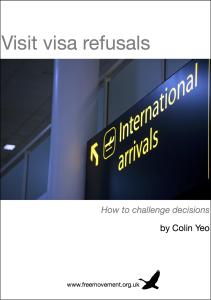- BY Free Movement

Family visit and PBS appeals to be scrapped
THANKS FOR READING
Older content is locked

A great deal of time and effort goes into producing the information on Free Movement, become a member of Free Movement to get unlimited access to all articles, and much, much more
TAKE FREE MOVEMENT FURTHER
By becoming a member of Free Movement, you not only support the hard-work that goes into maintaining the website, but get access to premium features;
- Single login for personal use
- FREE downloads of Free Movement ebooks
- Access to all Free Movement blog content
- Access to all our online training materials
- Access to our busy forums
- Downloadable CPD certificates

It looks like family visit appeals may be axed. Again. Those who have been doing this a while will no doubt be afflicted by a terrible sense of deja vu at this point, as this is not the first time this has happened.
The news seems to have broken via The Guardian yesterday and you can read the full article here. It is difficult to tell how certain the change is at this point. The authors of the article describe the leaked document as a ‘submission to the immigration minister’ but the rest of the article is written as if the change is definitely going ahead. It may be that the journalists have more information than was contained in the leaked policy paper.
It is not only family visit appeals that are in the firing line. Points Based System appeals may also be scrapped:
“The leaked Home Office submission to the immigration minister outlines a bid for secondary legislation in the new parliamentary session starting this autumn to abolish appeal rights for family visitors. It also discloses that ministers want to scrap the right of appeal for thousands of skilled migrant workers in Britain who want to extend or renew their visas under the points-based system.”
It is said in the article that 36% of family visit appeals are successful. I found this surprising as I understand the allowed rate to be much, much higher, especially for those who opt for an oral hearing. The quarterly statistics from the tribunal do seem to suggest this is about right, though.
The quality of Entry Clearance Officer decision making remains absolutely dire at some posts, as demonstrated by the high success rates on appeal against those posts and the reports of the Chief Inspector of UKBA, John Vine. Removing appeal rights would effectively bar many family members from ever coming into the UK as poor quality refusals are commonplace and once a person has been refused it is all but impossible to succeed in future applications. It is one of the things about immigration work that I find most upsetting, oddly: winning family visit appeals when the wedding or funeral is already over. A more empty victory is hard to imagine.
The Home Office very seldom bother to turn up to Points Based System appeal hearings at Hatton Cross and Taylor House these days, so the main saving would surely be to the tribunal rather than UKBA. A very considerable number of these appeals succeed. The allowed appeal rate for ‘managed migration’, which is a synonym for the Points Based System, is as high as 54% for the third quarter of 2010, the latest figures I can find. The Home Office continues to refuse to apply Pankina and officials carry on applying the policy guidance as if it were law, even though this is plainly and manifestly wrong. It would be grossly unfair to remove the right of appeal in these circumstances.
Alternatively, it may be that the unenacted section 19 of the UK Borders Act 2007 is finally around the corner. This would remove any meaningful appeal.
If these appeals are axed, the wealthy will resort to judicial review. The poor will suffer from unlawful, incorrect decisions.
SHARE

